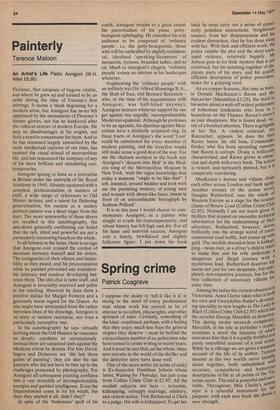Spring crime
Patrick Cosg rave
I suppose the desire to 'tell it like it is' is strong in the mind of every professional man whose work has proved to be of interest to novelists, playwrights, and other spinners of tales. Certainly, something of the kind — combined, perhaps, with a feeling that they enjoy much less than the general respect they deserve — must lie behind the extraordinary number of ex-policemen who have turned to crime writing in recent years. And it must be said that, on the whole, these new recruits to the world of the thriller and the detective story have done well. , One of the more senior (in terms of rank) is Ex-Inspector Hamilton Jobson whose latest, Waiting for Thursday, has just come from Collins Crime Club at £2.95. All the modish subjects are here — terrorists, kidnapping, unhappy marriage, adultery, and violent action. Tom Richmond is Clerk to a judge. His wife is kidnapped. To get her
back he must carry out a series of apparently pointless instructions. Neighbours suspect, from her disappearance and his evident distraction, that he has done away with her. With luck and efficient work, the police rumble the plot and the story ends, amid violence, relatively happily. Mr Jobson goes in for little mystery that is Ot contrived, but his notching together of disparate parts of his story, and his quietlY efficient description of police procedure, make for a gripping read.
An ex-copper features, this time as hero, in Donald MacKenzie's Raven and the Ratcatcher (Macmillan £3.25), the third in , his series about a well-off retired policeman of bohemian tendencies who lives in a houseboat on the Thames. Raven's sister's au pair disappears. She is found dead, victim of a botched abortion. There is gelignite in her flat. A violent criminal, the Ratcatcher, appears. So does the wan Raven hates: his old boss, Commander Drake, who has been spreading rumours that Raven is corrupt. Drake is brilliantly characterised, and Raven grows in attraction and depth with every book. The action is violent, and intricately plotted, but it is completely convincing.
MacKenzie's heroes and villains chase each other across London and back agaut. Another trouper of the action novel, Douglas Rutherford, uses the whole of Western Europe as a stage for the counter chases of Return Load (Collins Crime Club £2.95). Normally I am not much given t° thrillers that depend on recondite technical information for the underpinning of their adventure. Rutherford, however, delves brilliantly into the strange world of trans' continental road traffic, and comes up with gold. The modish obsession here is kidnar ping — twice over, as a driver's child is taken to make him and his wife undertake a dangerous and illegal journey with 3 mysterious load. Rutherford deserves WI'„ marks not just for two desperate, but con' pletely non-repetitive journeys, but for the best collection of unsavoury villains fe'r some time. Among the ladies the current obsession itS Victoriana. Anna Clarke takes what is h°th her own and Gwendoline Butler's develqmg speciality to new lengths in The LadY Black (Collins Crime Club £2.95) which ye the novelist George Meredith as detective. . This daring stroke succeeds completelP Meredith, in his role as publisher's rearkeri; examines a novel the intensity of `Age A convinces him that it is a partly truthfuIanu partly untruthful account of a real crirrle While he is offstage we are given a sePar.at.. account of the life of its author. Tensto: mounts as the two worlds move steal closer together, both embellished it accurate, sympathetic and hu0r.,0.0
rn „ descriptions of life at all points of the
v torian scene. The end is powerful and ine e itable. Throughout, Miss Clarke's seree.„ style is a splendid instrument for 11c: purpose: with each new book she shows new strength.


































 Previous page
Previous page